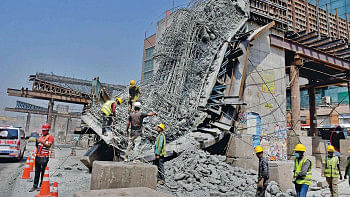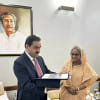We must rethink our foreign reserve strategy

In the intricate dance of international economics, Bangladesh finds itself at a pivotal crossroads. As we grapple with the challenges posed by dwindling foreign reserves and escalating project costs, the nation's ability to manage foreign reserves effectively and negotiate loans prudently has never been more critical. Yet, the glaring inefficiencies in our current approach to government-to-government (G2G) funded projects are cause for alarm. If Bangladesh is to safeguard its economic stability and ensure sustained growth, the time for reform is now.
The negotiation crisis
At the heart of the problem is a failure in negotiation strategy. Too often, we find ourselves locked into agreements that seem to serve everyone except Bangladesh. Project delays, cost escalations, and contracts signed under unfavourable terms have become the norm. These outcomes stem from a lack of expertise and patriotism among the negotiators representing our national interests.
Effective negotiation requires more than just a senior government official with academic credentials. What Bangladesh truly needs are skilled negotiators—successful businesspeople with substantial international experience who possess both the knowledge and confidence to engage with countries like the US, China, and India. Such individuals must be fluent in the language of international trade, able to protect not only their company's interests but, more importantly, those of Bangladesh.
Reassessing the management of foreign reserves
The interim government's foremost challenge is the preservation of our foreign currency reserves. Maintaining even the current levels will be difficult unless we renegotiate existing contracts with countries like Russia, Japan, China, and India. Such renegotiations must be conducted strategically, without animosity, but with firm resolve.
Bangladesh is not a minor player on the global stage. With a population of 170-plus million, we represent a significant market, and our geopolitical importance should not be underestimated. We are not in the business of begging for loans. Instead, we seek win-win agreements, ensuring that both Bangladesh and its lenders benefit equally.
Our immediate focus should be on renegotiating the terms of projects like the Rooppur Nuclear Power Plant and the Padma Bridge. These mega-projects, funded through G2G agreements, were often politically motivated, with large portions of the funds diverted to local agents and commissions. As a result, the terms were not negotiated in the country's best interest. This is evident in the case of the Rooppur project, where repayments are set to begin before the plant becomes operational—an inexplicable failure in negotiation.
Learning from the Adani Power deal
One glaring example of poor negotiation is the contract signed with Adani Power, rushed through in just 30 days under highly unfavorable terms. The rate at which Bangladesh buys power from Adani is nearly double that of other sources in India. Local entrepreneurs, who set up power plants with their own investment, offer electricity at better rates. This contract, like others, needs to be re-examined and renegotiated.
A skilled negotiation team can sit down with foreign governments and companies, making it clear that while they are our friends, the terms must change. A grace period of 5-7 years, as is standard practice, should be included in repayment terms. Extending the grace period by a few years without reducing the total repayment period can be achieved through proper dialogue.
Deferred payments: A potential lifeline
One promising solution to our foreign reserve crisis is the introduction of deferred payment systems for imports. For example, Bangladesh imports $23 billion worth of goods from China. To ease the immediate pressure on our reserves, if we could negotiate a deferred payment system with the Chinese government for $5-10 billion worth of industrial raw materials, to be repaid over 3-5 years, it would provide significant relief. Such deals are not only feasible but also beneficial for both parties. Deferred payments would allow Bangladesh to continue industrial growth without the immediate outflow of foreign currency, thus stabilising our reserves while simultaneously fostering job creation and increasing productivity.
Addressing project delays and cost escalations
One of the most significant obstacles to Bangladesh's economic growth is the repeated delays in completing foreign-funded projects. Extending a project's timeline from three years to five or seven years inflates loan commitment charges, worsening our already unfavourable terms.
A primary culprit in these delays is the practice of hiring consultants on a man-month basis, which incentivises them to prolong projects to increase their fees. This system must be overhauled. Consultants should be hired with a vision for the country's development, and project management teams should prioritise national interests over personal gain.
For 20 years, we have seen the same cycle of delays and cost escalations. A new approach is long overdue.
Reforming the G2G scheme
Finally, we must confront the inherent weaknesses in the G2G funding model. Lack of international competition, high-interest rates, and politically motivated contracts are just a few of the systemic problems. Worse, Bangladeshi companies are often excluded from joint ventures, preventing the transfer of technology that could benefit our economy.
Foreign reserves do not benefit either, as funds from these projects are repatriated directly. This must change. Bangladesh must negotiate terms that allow for joint ventures and local involvement, ensuring that our economy reaps the rewards of these mega-projects.
A call for reform
The path forward is clear—Bangladesh must take control of its future by engaging in more effective negotiations and selecting the right individuals to represent its interests. We need to introduce deferred payment systems and renegotiate existing projects to alleviate the immediate pressure on our foreign reserves. Above all, we must stop signing unfavourable contracts that burden future generations.
By taking these steps, Bangladesh can achieve economic stability, foster growth, and avoid the traps of cost escalations and project delays that have plagued us for far too long.
It's time for change, before it's too late.
Ghulam Mohammed Alomgir is a BUET graduate and chairman of a group of companies. He is the founder president of BUET Graduate Club Ltd.
Views expressed in this article are the author's own.
Follow The Daily Star Opinion on Facebook for the latest opinions, commentaries and analyses by experts and professionals. To contribute your article or letter to The Daily Star Opinion, see our guidelines for submission.

 For all latest news, follow The Daily Star's Google News channel.
For all latest news, follow The Daily Star's Google News channel. 








Comments